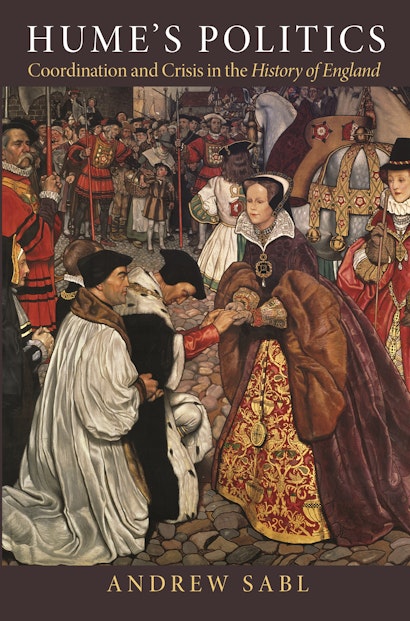Hume’s Politics provides a comprehensive examination of David Hume’s political theory, and is the first book to focus on Hume’s monumental History of England as the key to his distinctly political ideas. Andrew Sabl argues that conventions of authority are the main building blocks of Humean politics, and explores how the History addresses political change and disequilibrium through a dynamic treatment of coordination problems. Dynamic coordination, as employed in Hume’s work, explains how conventions of political authority arise, change, adapt to new social and economic conditions, improve or decay, and die. Sabl shows how Humean constitutional conservatism need not hinder—and may in fact facilitate—change and improvement in economic, social, and cultural life. He also identifies how Humean liberalism can offer a systematic alternative to neo-Kantian approaches to politics and liberal theory.
At once scholarly and accessibly written, Hume’s Politics builds bridges between political theory and political science. It treats issues of concern to both fields, including the prehistory of political coordination, the obstacles that must be overcome in order for citizens to see themselves as sharing common political interests, the close and counterintuitive relationship between governmental authority and civic allegiance, the strategic ethics of political crisis and constitutional change, and the ways in which the biases and injustices endemic to executive power can be corrected by legislative contestation and debate.
Andrew Sabl is professor of public policy and political science at the University of California, Los Angeles. He is the author of Ruling Passions: Political Offices and Democratic Ethics (Princeton).
"Andrew Sabl has written an exceptionally fine overview of David Hume's History of England. . . . The History into which Hume poured such brilliance remains an undiscovered continent. . . . But with Sabl's full-length study, we can say that it has finally been mapped."—David Walsh, Perspectives on Politics
"David Hume's History of England, a long-neglected classic of political philosophy, has recently become the object of serious study by political theorists. Hume's Politics, one of the best books on Hume published in recent years, shows convincingly how much political theorists and political scientists have to learn from Hume's masterpiece. . . . Sabl shows that Hume's political theory is a more than worthy conversation partner with the political science of today. He thus points to a political science that is superior to both merely normative political theorizing and positivistic political science."—."—Thomas W. Merrill, Review of Politics
"[E]xtraordinarily painstaking and erudite study of [Hume's History] in its six-volume entirety."—Political Theory
"Sabl extracts from Hume's neglected History a wide-ranging and powerful work of political theory—the theory of dynamic coordination—pointing out that the tools with which to state it explicitly and abstractly as a theory were not invented until two centuries later. He refers of course to game theory, and to Schelling's clarification of coordination and the focal point phenomenon. Sabl's work is a persuasive, revealing, and masterful synthesis."—Randall Calvert, Washington University in St. Louis
"This remarkable book restores David Hume's political thought to its rightful place at the center of political theory and connects Hume to central themes in contemporary political analysis. Sabl does justice to the details of Hume's account without ever losing the thread of the main arguments. A magnificent achievement."—William A. Galston, Brookings Institution
"Hume's Politics engages Hume's History with unrivalled erudition and sensitivity to detail, and convincingly unlocks the structure and logic of that work through a novel analysis of the principle of dynamic coordination. Sabl not only gives us a new way to understand Hume's theory of political authority but also develops, through his reading of Hume, an original conception of the grounds of authority and the basis of political coordination. Throughout, he powerfully models a form of normative theorizing that fruitfully integrates historical and empirical studies of politics. A truly impressive achievement."—Sharon R. Krause, Brown University
"Sabl shows how Hume might be read as a political theorist, and believes that Hume's History of England is a paradigm example of what realist political theory should be like. Sabl's approach is a fruitful one that deserves our attention. There is much that anyone interested in Hume and in his History stands to learn from this book."—James Harris, University of St. Andrews
"Sabl has written an ambitious and often surprising book. He rescues the neglected History of England—the work for which Hume was best known in his own time—and shows that it is an important part of his political theory. But this is no mere historical study. In Sabl's hands, Hume becomes perhaps the first political theorist to study the evolution of and change in coordination strategies in politics and the implications for understanding political institutions and behavior."—John T. Scott, University of California, Davis


